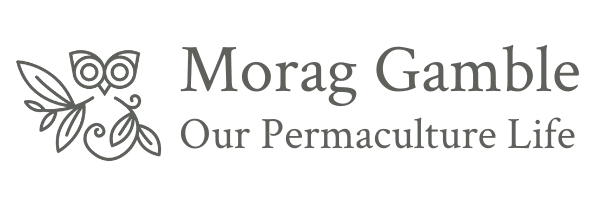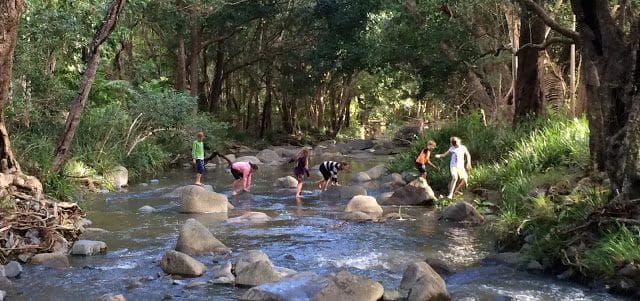School holidays start here next weekend. Here are some great outdoor activities to get the kids involved with – or to do even if you don’t have young children around!
You can make them as simple or in-depth as you like. Of course, these activities are not just for the holidays – we love to do these things every week. In fact, they form the basis of many of our home education ‘lessons’.
 |
| Rock hopping at the upper Mary River. |
You don’t need to know anything about the plants, animals, lizards, insects or weather to step outside and begin exploring. Nature is out your doorstep – all you need is to be open to wandering and wondering.
Silent Spring author, Rachel Carson, wrote another inspirational book, The Sense of Wonder. In this book, written over three decades ago, she shares an her philosophy about the importance of sharing the wonder of nature with children. She says “wonder …leads to curiosity … leads to information …leads to responsibility … leads to action”. This simple power of discovery and connection is such an antidote to indifference.
You don’t even need to know what you are looking for, just some curiosity, patience to sit and watch what is going on around you, and an ability to notice things. Draw and jot down your discoveries. Share your findings with each other, and through apps like Bowerbird (Check out other citizen science sites in my previous post: http://our-permaculture-life.blogspot.com.au/2016/09/raising-earthcarers-1.html).
Bring your questions back inside and do some research – in books, on the internet, or find people who can help can. People who are passionate about their topic are so keen to share it, particularly with young enthusiasts.
There are great lists out there for nature play activities, for example.
We’re going to have a go at these fun, open-ended activities over the next few weeks…
Become a Naturalist (a person loves to study nature)
Head out on a field expedition or nature quest at different times of the day, to different places with your family and friends. Be a nature detective – step outside, what do you see, what do you hear, what can you feel, what do your wonder…?
Make a nature adventure backpack – binoculars, magnifying glass, small field guides, pen knife or scissors (for taking a sample from a plant), notebook, pencil case (pencil, eraser, ballpoint, felt-tipped pen, colour pencils), clips (for holding pages), hat, sunscreen, water.
Draw what you see – a leaf, a seed, a weed, a flower, a tree, a bird or group of birds, an insect, tracks, scats (animal poo), clouds … Make a note of what insect calls, bird calls, other animal sounds you can hear.
You could go into your backyard, down the street, to your local park, to a local forest, beach or countryside… For a quick expedition perhaps just take a notebook and a pencil. Make a point of always recording your notes and drawings
(Kids – always make sure someone knows where you are heading).
 |
| Bees in the kitchen garden |
Become an Astronomer (a person loves to study the stars)
Go outside at night and for some wonderful star gazing. Can you see the milky way? What constellations can you see? Do you know which ones are planets? Can you see a shooting star – why does it do that? How many satellites have you spotted? Do you know how to tell the direction from the stars? Take a picture of the night sky and leave the shutter open for 30 minutes or more (you’ll need a tripod). Learn more about the stars and constellations (get a free app eg: SkyView)
 |
| Night sky at our place by Columbian WWOOFer Alejandro Cappa. |
Become a Meteorologist (a person loves to study the sky/weather)
Go cloud watching and look for weather clues. Learn to read the clouds. What can you tell about the weather by the types of clouds – is wind, rain or a storm coming. Draw the clouds. Research about what the different types are called and what they mean. Get a field guide about weather and clouds – such as Cloudspotter. Use your imagination too – write a cloud poem, tell a story about the pictures you see, can you see an animal, a face…?
Become a Geologist (a person loves to study rocks)
What kinds of rocks are there in your area? Make a rock collection. Sort them. Find out what they are made of (look in your rock books or online to help with rock ID). What does that tell you about the deep history of your place? Can you find fossils? Can you draw with your rocks? What games can you make up a game with your rock and pebble collection.



I homeschooled ("organic" learning not textbooks!) my last child, & this post brought back so many wonderful memories. We loved to have days absorbed in nature, & I still have enjoy many of the guide books, nature ID books, etc. This child is now 40 yrs. old & still has this love of nature & shares it with children every day. I learned so much in exposing her to this & cherish these memories. To me being in nature, learning, appreciating & protecting is what gives our lives meaning!! I enjoy your blog & would love to hear more of the environmentally positive aspect of your house. Thanks for sharing. Mary Ann in GA/USA